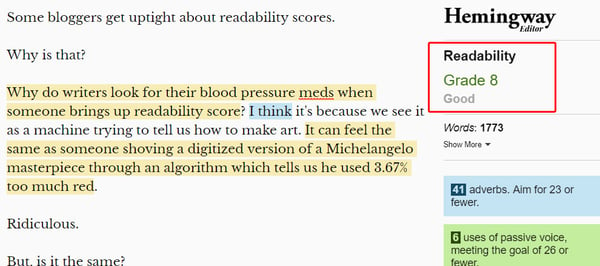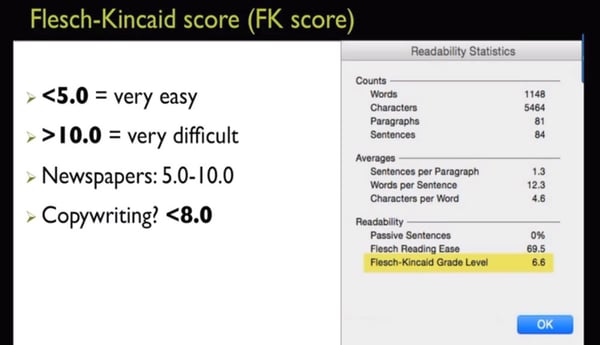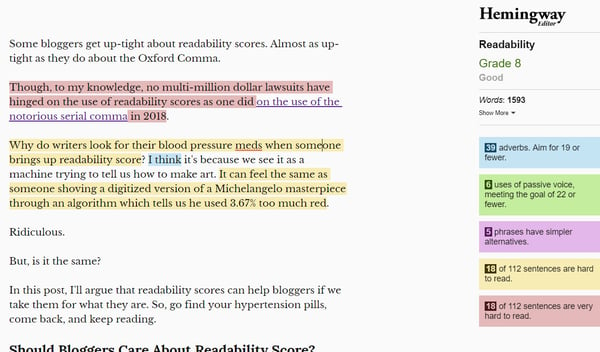Some bloggers get uptight about readability scores.
Why is that?
Why do writers look for their blood pressure meds when someone brings up readability score? I think it's because we see it as a machine trying to tell us how to make art. It can feel the same as someone shoving a digitized version of a Michelangelo masterpiece through an algorithm which tells us he used 3.67% too much red.
Ridiculous.
But, is it the same?
Should Bloggers Care About Readability Score?
A readability score is a way of numerically measuring the complexity of writing. Texts with longer words, sentences, and paragraphs are generally harder to read than those with shorter components. Scores are given on either a 0-100 scale, with the higher numbers being easier to understand, or on an educational grade level.
NOTE: Sometimes readability refers to how the text is displayed on the page or screen. That's not what we're talking about here. For this conversation, readability refers to the thoughts themselves, not the way those thoughts are displayed in a visual context.
Is readability score a method for evaluating the quality of writing? No. Readability score doesn't tell you whether a piece of writing is good or not. It just tells you whether the structure of the thoughts makes them generally easier or harder to grasp.
This is where the analogy of Michelangelo's masterpiece breaks down. The readability score concept applied to painting wouldn't tell us if Michelangelo's painting was good or not. The score would just tell us how difficult it would be to interpret the meaning the artist had in mind.
Why Bloggers Should Care About Readability Score
This is the reason bloggers should care about readability score.
People approach reading blog posts differently than they do perusing The Louvre. We're in a hurry when reading blog posts. We skim. We're not going to stand back and try to interpret and appreciate the fine nuances of phrase. We want to understand the topic and get advice quickly. We're quite willing to look at the headings and skip to the points we care about.
So, in general, the easier the post is to comprehend, the more skimmable, the better.
Because we're writing to grow our businesses by helping our customers, rather than to simply scratch our own creative itch, we focus on what the reader wants. That mindset should carry over into everything we do. We call it customer-centric marketing. Learn more about how what we mean by customer-centric marketing here.
Are there exceptions? Sure.
We have a writer on our team who regularly writes at a 12th to 14th-grade level whose posts are easier to read than some muddled 7th-grade pieces. Why? She writes clean copy which makes sense. She also writes content on fairly technical subjects for a highly educated audience, so the higher complexity of her posts works just fine in this context.
But, she's the exception, not the rule.
So, what readability score should bloggers aim for?
Aim for 8th Grade Level, Focusing on Sentence Length
Several experts advise aiming for eighth grade reading level. And, partially because I naturally and consistently write at that level, I wholeheartedly agree! :)
In Malcolm Gladwell's new Masterclass on Writing, he covers readability in a lesson titled "Write Sophisticated Ideas Using Short Sentences." Here, Gladwell is very specific about what element of readability score he cares about. Long sentences are a no-no.
He gives a specific grade level target along with a "clear an simple" admonition:
"Your first goal is to be clear and simple, to write at an eighth-grade level, but with ideas that are super-sophisticated."
Steve Linney, CMO for readable.com and Content Marketing Institute contributor, also recommends eighth grade as a goal for bloggers, while he differentiates levels for other types of content.
As a general rule of thumb, we aim for a reading level of grade eight for our blog posts – which is the level of a 14- or 15-year-old – to ensure that a wide audience can understand our content. We focus on grade 10 for e-books and grade 12 for white papers and books.
Digital Marketer joins the eighth-grade chorus in their Copywriting Mastery Course. According to DM, web copywriters have even less latitude in readability than newspaper journalists.
The most widely used SEO tool in existence, Yoast's Wordpress Plugin, makes recommendations based on readability. You might be able to guess where they land. Note that Yoast also brings up sentence length, specifically, as an area of focus.
"A reading ease score of 60-70 [7th-8th grade] is believed to be acceptable/normal for web copy ... If your sentences are too long – over 20 words – people might lose track of your point."
Ann Handley, author of Everybody Writes and Content Rules, recommends simple writing. In Everybody Writes, Handley's "Be Rabid About Readability" chapter contains this advice:
"In general, the best Web writing isn't necessarily short, but it is simple, with shorter sentences with no more than 25 words in a sentence."
"For much web content, a score of 60 or above [8th grade or lower] works."
"Online, we tend to scan more, so shorter words and sentences are more important. The longer the word, sentence, or paragraph, the longer the brain has to postpone comprehending ideas until it can reach a point where all of the words, together, make sense."
In some fields, regulatory bodies even weigh in. Because it is vital that healthcare information is accessible to the widest audience possible, the National Institutes of Health says,
"Several healthcare organizations have recommended the readability of patient education materials be no higher than sixth- to eighth-grade level."
When I was writing web content for a major healthcare conglomerate in North Carolina, we reworked a lot of the existing content to lower the readability level to around sixth grade for this purpose.
Does Readability Score Influence Search Rankings?
Does readability score influence Google rankings? I'd answer with a qualified "probably not directly." There are indications that readability score is on the lower end of their 200 variables, but we're not sure. In other words, it is possible that Google attaches a numerical score to your content based on readability, but, if so, it isn't a huge factor.
Google knows what we all know. Readability scores aren't an indication of quality. Content with a good readability score for the web may be terrible.
But, change the question slightly, and I'll give you a much different answer. "Does readability (as opposed to readability score) influence Google rankings?" Absolutely.
We do know that Google builds their rankings around signals which indicate that actual humans like what they read.
If your content is easily understandable and consumable, logic says that more people will link to it, and links are known to be the strongest signal in Google's PageRank algorithm. Readable content naturally gets more links and, therefore, rises in the rankings. Same goes for social media shares.
We also know that Google heavily weights dwell time (the time someone spends on a page before heading back to Google) in their algorithm. So, if we know that most people want to skim, and they see a page with dense blocks of text, they'll head back to Google immediately, which is a negative factor in Google's eyes.
So, readability score may be a minimal factor directly influencing Google's search algorithm, but readability indirectly impacts links and dwell time, which we know are huge factors in rankings.
How to Improve Readability Score
If readability score has a correlation with what's considered to be good, readable web content, how do we improve our score in an attempt to write better blog posts?
Keep in mind I'm not recommending you run every piece of content through a readability score analysis for the rest of your life. I do think it can be helpful to look at readability score for the next few pieces you write to see if you can make some adjustments to your writing style.
Once you get the hang of it, you'll have it without looking at your score. Pretty soon, you'll be able to accurately guess your reading score just by looking at what you've written.
I'm not saying you should drastically change your writing style. If you naturally write at a 10th grade or above level, try knocking that down a single grade and seeing if you think you're just as clear as you were. Small adjustments can make a big impact.
Here are three tools you can use.
1. Hemingway Editor
Hemingway Editor is a free app that is probably the best readability learning tool out there. As you might guess, given that Ernest Hemingway was a master at writing powerfully concise text, the Hemingway Editor will highlight words, sentences, and phrases which could be made simpler. You get to see your grade level in real time as you type.
Here's a screenshot of the Hemingway Editor analysis of this post draft to this point.
Looks like Ernest would roll over in his grave at my 39 adverbs. I knew I had a couple of complex sentences up top, so I intentionally threw in a couple of tiny paragraphs after them to break up the flow and create some white space.
2. Pay Attention to Grammarly
If you have a paid Grammarly account (recommended), don't just look at the red underlined "critical" errors. Look at their suggestions with yellow underlines as well. You'll probably be surprised at how many times you write in passive voice (another Ernest Hemingway cardinal sin). Grammarly also calculates readability score which you can find in the Performance tab.
3. Read Elements of Style
Elements of Style by Strunk and White is a classic. It's free on Kindle and a short read, so you have no excuses for skipping this one. I don't think there's a better manual in existence for making your writing more simple and powerful. Pay special attention to the chapter "Omit Needless Words."
Speaking of Search Rankings
While I argue that readability does influence search rankings, there are a lot more optimizations you can make to increase organic traffic to your posts. We've developed a free resource which you can access right now to level up your blog posts for Google. In The Ultimate Guide to Increasing Organic Website Traffic, we'll show you 12 tactics to use to explode your organic traffic, including:
- On-Site optimization - Send Google the right signals.
- Content optimization - What content performs best on search?
- Content promotion - The best ways to promote your content without spamming.
- Video marketing tweaks - How to turn your videos into hyper-searchable traffic-builders.
- The Fresh Test - How to keep your content sparkly clean and fresh in Google's eyes.
- Plus more...







